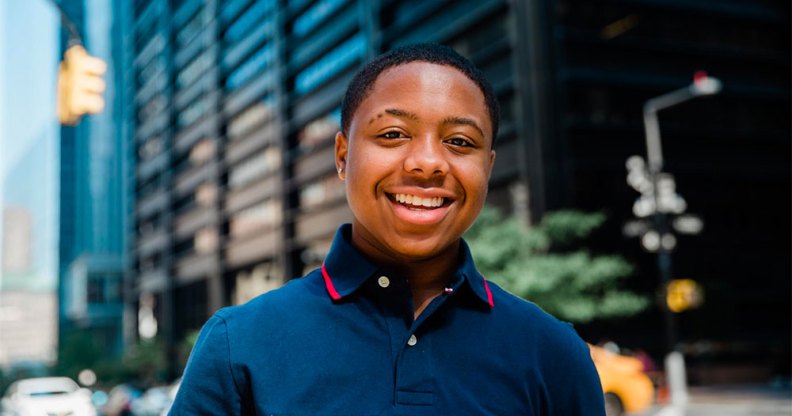As Day of Silence goes virtual, queer students fiercely keep up the fight against homophobia and transphobia despite lockdown

JP Grant is one of thousands who are taking part in Day Of Silence 2020. (GLSEN)
Day of Silence 2020 will see thousands of LGBT+ students and allies gather virtually to protest homophobia and transphobia on Friday (April 24). PinkNews spoke to some of the activists involved in making it happen.
For 25 years, LGBT+ students and allies have rallied against the silencing, erasure and mistreatment of queer people on the annual Day of Silence, which as the name suggests, involves taking a vow of silence for one school day.
This year, they’re taking their protest online. With schools closed due to the coronavirus pandemic, GLSEN, the leading organisation on LGBT+ issues in K-12 education in the US, is delivering a wealth of online resources to help connect and empower students, culminating in a virtual rally featuring March For Our Lives founder Emma González and Queer Eye‘s Tan France as special guests.
There is also a major grassroots effort being driven by community leaders, including LGBT+ students themselves.
JP Grant, 18, is a 12th grade student from Boston, Massachusetts.
He’s an artist, an aspiring educator, and a bisexual trans man who also identifies as non-binary in regards to how he expresses his gender. JP became involved with his school Gay Straight Alliance (GSA), and eventually the GSLEN National Student Council, because he “really needed something where [he] felt belonging”.
Because of COVID-19, JP’s final year of school has been cut short. There’ll be no graduation, no prom, no saying goodbye to his friends before heading off to college.
“It’s really sad because I don’t get to have those same memories,” he says.
Lockdown measures have also left him worried for his mother, a nurse, and for his scheduled top surgery in the summer, which is now looking uncertain.
Despite dealing with these personal issues, JP remains dedicated to lifting the voices of others, and will be spending Friday hard at work organising and campaigning online.
“We’re going 100% virtual,” he explains. “We’re gonna actually have some friends there [for Day of Silence], we have celebrities coming in to join us and honour and celebrate the work that we’re doing.”
As a member of the National Student Council, JP is used to working virtually, and wants this year’s protest to underline that even under lockdown measures which are disproportionately damaging to young LGBT+ people, the community still has a voice.
“Our work still does continue,” he says. “That’s something that we wanted to emphasise during COVID-19, that we do have these resources. The Day of Silence was put together 25 years ago, and we’re still going to continue that whether it is in person or not.”
Rebecca Semik is student programs manager for GLSEN Phoenix.
She’s helping to organise a social media campaign where LGBT+ students can share how they’re keeping the Day of Silence spirit alive from home, and setting up Google Hangouts for young adults to break the silence together.
“Right now, what students need most is to know they are not alone,” she says.
“Raising awareness and being public with their solidarity goes a long way for students hoping to feel seen.”
For students like JP, one of the biggest issues they face – aside from continued attacks from the White House – is a lack of resources for LGBT+ students, and about queer identities.
Despite this JP says that he feels fortunate to be coming of age in an era where many people are “more open and accepting” of identities like his.
“There was a period when it [being LGBT+] wasn’t talked about, when the Day of Silence really as a huge factor.
“There was a barrier of, ‘Well why do we need this?’ And so it was about explaining to people what the purpose of it really was.”
He credits his teachers, who “definitely stepped up”, and his peers for educating themselves about LGBT+ issues. This is something he says comes more naturally to the latter group, speaking of a generational shift in acceptance.
“I think there’s a still a huge stigma around what it means to be trans. It’s a problem all across the board, however, I do think it is a prominent issue in generations that didn’t have any exposure to what LGBTQ really is.
“I think people think that they must have a role in someone else’s identity. I think that’s the number one misunderstanding, when actually someone else’s gender identity doesn’t affect you at all.”

